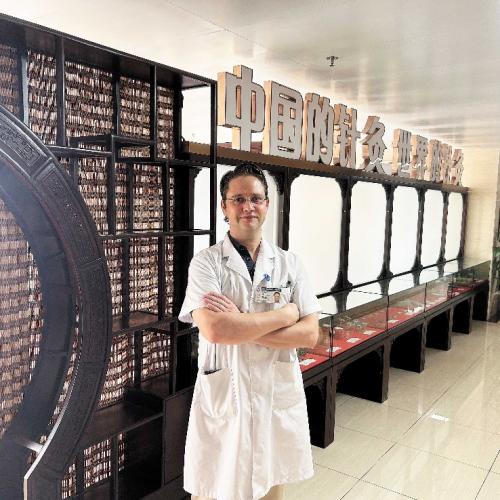



Martin Haase, an enthusiast of traditional Chinese medicine from Canada, has been in China for 17 years. He has a Chinese wife and two daughters who are attending public school in Changsha, Hunan province.
His daughters' first language is Chinese and English is their second, he said. He has been fascinated by China and Chinese culture since high school, during which he started practicing Chinese martial arts and learning about Chinese philosophy such as Taoism.
Influenced by his grandmother's knowledge of herbalism, he became interested in natural healing.
Similarly, he said, traditional Chinese medicine is a healthy way of living that can strengthen your body and has a rich philosophy about being in harmony with nature and the seasons.
In 2004, he enrolled in a traditional Chinese medicine college in his hometown of Victoria, British Columbia. It took three years to complete his acupuncture course, after which the dean of the college recommended him to go to China under an exchange program to Hunan University of Chinese Medicine in Changsha, capital of Hunan, to gain more experience.
"I thought it was an amazing opportunity because before that it had always seemed like an impossible thing to do. It seemed too far away and too difficult. I realized that in life, all one has to do is to make a conscious decision and go for it! And it was the best decision I have ever made," he said.
He arrived at Hunan University of Chinese Medicine in 2007 and has been living in Changsha ever since.
"Despite the challenging weather, Changsha is my second home. I just feel comfortable here. I feel at home," he said.
He is currently pursuing a master's degree in acupuncture, moxibustion and tuina massage at the university. "Changsha is a terrific place to learn Chinese medicine. The resources in the hospital and at the university are fantastic and I'm very grateful to all my teachers here."
Haase said some of his patients don't fully understand Chinese medicine, even though they're Chinese, and the idea of a foreigner doing it seems funny to them.
However, once they start to experience how he works with them, diagnoses them, lets them know what the problem is and why, and then lets them know what he is going to do for treatment, they will better understand it and trust him. A lot of his patients have been recommended by other people, he said.
"I think it's really amazing as a foreigner to be able to give acupuncture to Chinese people in China. It is a little ironic, especially if it's their first time to ever receive acupuncture. I feel extremely appreciative and touched that I'm able to receive their trust and respect," he said.

Haase said TCM is his "go-to treatment" for everything, as he can treat himself, or go to his classmates or teachers for help if necessary.
He is also working actively to bridge the connections between Canada and China through TCM and martial arts. He has finished translating several TCM-related books from Chinese to English.
A lot of people abroad are interested in and curious about TCM and often ask what it is, and how and why it works, he said.
"When we talk about traditional Chinese medicine, actually what we're often talking about is how to treat, benefit and strengthen the body. One of the things that I love about TCM is that we concentrate on the patient's health and healing, not just on the disease," he said.
"What's wonderful about TCM is that there are different tools to treat the problem, whether they are external such as acupuncture, cupping and massage, or internal treatment methods such as using herbal medicine, diet therapy or guiding patients on a healthy lifestyle," he added.
Canada was one of the first countries to standardize TCM, and there are three public universities where it is taught, in addition to private colleges.
Chinese medicine in Canada is more standardized than in many other countries, and acupuncture can be covered by medical insurance, which means it's recognized by the Canadian medical system, he said. He intends to finish his master's degree by the end of this year and potentially do a PhD in TCM.
Zhang Li, 44, from Changsha, is one of Haase's patients and has been getting acupuncture treatment to treat lower back pain.
"It is novel to be getting TCM treatment from a foreigner, and I think foreigners who want to learn TCM have a genuine interest in it and put a lot of effort into their research, so I trust him."
Craig Johnson from the United States is a friend of Haase in Changsha and is also one of his patients.
Johnson has known him for a long time and sees Haase's passion when he talks about TCM and treating patients in the hospital, so he trusts him as his doctor.
He has received acupuncture and massage for exercise-induced muscular pain, which has worked well and has helped relieve muscle tension, he added.
zoushuo@chinadaily.com.cn
If you have any problems with this article, please contact us at app@chinadaily.com.cn and we'll immediately get back to you.